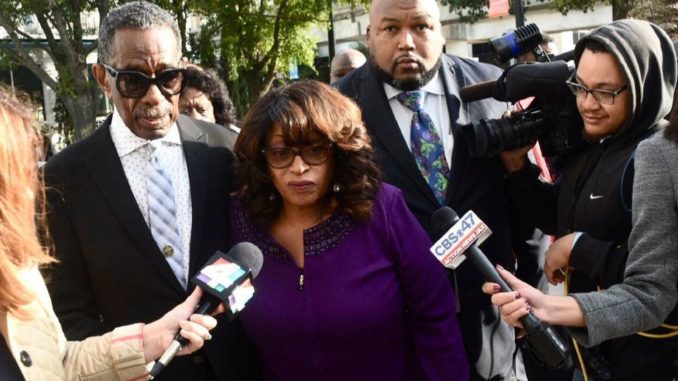
:strip_exif(true):strip_icc(true):no_upscale(true):quality(65)/arc-anglerfish-arc2-prod-gmg.s3.amazonaws.com/public/ASXRETJWHVDY5BCVJICKSHGE7I.jpg)
Former congresswoman Corrine Brown who reigned for over two decades, wants to be released from prison because she believes her underlying health conditions place her at great risk of dying if she were to contract COVID-19, according to a motion filed by her appellate attorney.
The fear of a coronavirus outbreak is widespread among inmates in Florida prisons. Today the Florida Black Caucus also issued a letter to the governor highlighting compassionate release for at risk inmates.
President Donald Trump and Anthony Fauci, director of the National Institute of Allergy and Infectious Diseases, said during a White House briefing Tuesday that African Americans are being hit hard by the coronavirus, representing a “tremendous challenge” for the nation, according to the president.
Brown, who was convicted of federal corruption, conspiracy, tax evasion and fraud, is serving a five-year sentence in FCI Coleman, a federal facility in Sumterville that has already had an outbreak of Legionnaire’s disease this year.
At the time of that outbreak, Brown was given an antibiotic based on her symptoms but was not given a diagnosis, her attorney, William Kent, explained in the motion.
Kent filed the emergency motion for compassionate release on Brown’s behalf.
Under federal law, compassionate release allows an inmate to be released when there are “extraordinary and compelling reasons.”
Brown filed a request for compassionate release with the warden at FCI Coleman on Feb. 26. She got a form letter denial on Monday and her attorney has since filed the motion with the court.
According to the filing, the prosecutor from the case, Assistant U.S. Attorney Tysen Duva, opposes the motion. A judge has given prosecutors two days to respond to the motion and has told them they must address recent guidance in light of COVID-19.
The motion argues that Brown will not pose a danger to the community if released but that her own health is at risk if she remains in prison.
Brown suffers from hypertension, diabetes, a heart murmur, acid reflux, sleep apnea and cataracts. Since being incarcerated, Brown’s health has “declined considerably” and has “deteriorated to an alarming degree,” according to the motion.
“These conditions would prove fatal were she to become infected with COVID-19,” Kent argues. “All of these conditions are now experienced under the constant threat of COVID-19 infection, which given Brown’s age and medical conditions put her at great risk of death.”
Kent argues that conditions for Brown have reached a “crisis stage” and that Brown was notified this week that her entire unit is being moved to double-bunk with another unit because the facility is taking in two infected inmates from a county jail.
Kent points out the inmate Brown will be bunking with is coughing.
Coronavirus causing concern in state prisons
Four inmates and 37 employees at 17 prisons and three probation offices throughout Florida have tested positive for COVID-19 as of Tuesday afternoon, according to the Florida Department of Corrections.
The spread of the virus to inmates and prison workers has fueled panic among detainees and their loved ones. Even before COVID-19 showed up in the state’s prisons, corrections officials canceled face-to-face visitations, cutting off one of the ways families and friends can communicate with inmates.
Corrections officials maintain they are taking many measures to prevent the spread of the virus.
New inmates are placed in quarantine, the temperature of inmates who are in medical quarantine is taken twice daily, and inmates in the general population can ask questions and request a temperature check, the agency said in an email Wednesday morning.
Corrections officials say inmates who have COVID-19 symptoms are placed in some type of medical isolation, which could vary depending on the health condition of the inmate.
“Medical isolation for an inmate could include being isolated alone in an infirmary or in a housing unit with other inmates who were also exposed to the virus,” Department of Corrections spokeswoman Michelle Glady said.
Meanwhile, inmates and their loved ones across Florida are bracing for further outbreaks within the state prison system, which has 143 facilities, more than 24,000 employees and roughly 94,000 inmates.
David Denney, an inmate at South Florida Reception Center, told his mother last week that “everybody is on edge” at the Doral prison.
Inmates at the facility do not have access to gloves, hand sanitizer or cleaning supplies, Denney said in a recording of the telephone call provided to the News Service.
Denney, who is serving a two-year sentence for battery, also said inmates are extremely anxious because they know that two workers at the South Florida prison have tested positive for COVID-19.
“We don’t want to get sick because this is not the place to get sick,” he said. “There are not enough respirators. There’s not enough anything. … It is going to be hell if we get sick.”
Black Americans are dying of coronavirus at much higher rates compared with other Americans in some major cities, but most federal officials and states are not keeping track or releasing racial data on coronavirus victims, raising concerns about care for the nation’s most vulnerable populations.
As coronavirus cases and related deaths soar in cities with significant black populations, including New Orleans, Detroit and New York, civil rights groups, Democratic lawmakers and the White House have called on federal health officials to release racial data to ensure resources and information reach every community affected by the outbreak.
Only a few states have released the racial information, including Illinois, Louisiana, Michigan, New Jersey and North Carolina. Data from these states shows blacks are dying at a disproportionately higher rate compared with whites.
Francine Frazier/News4jax and the News Service of Florida are credited for this report

Be the first to comment